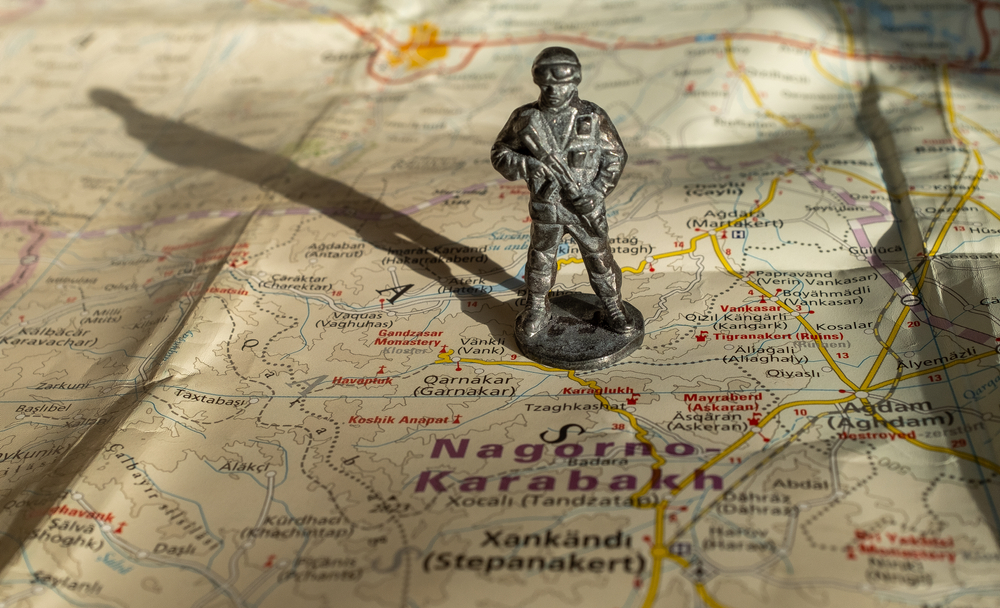On April 23, Azerbaijan announced the creation of a checkpoint on the Lachin corridor, a move immediately criticized by the de facto authorities of Nagorno Karabakh and those of Armenia. The United States and France have also expressed concerns
Azerbaijan has announced the creation of a checkpoint on the Lachin Corridor, a significant development in the aftermath of the 2020 Karabakh War. The April 23 move represents another assertion of sovereignty by Azerbaijan: not only on the strategic land route from Armenia, but also on the besieged separatist region of Nagorno Karabakh to which it connects.
The gesture also poses further challenges and implications for Karabakh’s ethnic Armenian population, as mediation efforts appear to falter after more than 133 days of transit restrictions by a self-styled environmental protest. Only the Russian peacekeeping contingent and the International Committee of the Red Cross (ICRC) used the route.
According to Baku, the road, together with an alternative route only recently confirmed, was used for “the rotation of personnel of the Armenian armed forces who continue to be stationed illegally in Azerbaijani territory, the transfer of weapons and ammunition, the entry of terrorists and the illicit trafficking of natural resources”.
Yerevan denies and rejects the allegations.
Baku’s move, however, had long been anticipated and may also be linked to the lack of progress in unblocking regional transport and communication routes in the region, as per the November 2020 trilateral ceasefire declaration. Both the Lachin Corridor is a land link between Azerbaijan and Nakhichevan via Armenia, but disagreements over border and customs controls have frustrated progress on the latter.
Criticisms came immediately from the authorities in fact of the former Soviet-era Nagorno Karabakh Autonomous Region (NKAO). “We appeal to the parties to the Trilateral Declaration and especially the Russian Federation to immediately start discussions to […] prevent the establishment of an Azerbaijani checkpoint […]’ they wrote in a Facebook post.
However, many commentators note, the location of the checkpoint on the Hakari Bridge was already in close proximity to the Russian peacekeepers, so the move had hardly gone unnoticed before the official announcement. Indeed, in a podcast by Armenian News Network – Groong on April 7, Armenian activists said that work was already underway.
However, there is no confirmation from other sources, and if some opposition activists claim that Armenian, Russian and Karabakh officials were already aware of the checkpoint, an official statement from Yerevan did not mention it.
“We call on the Russian Federation to finally fulfill its obligation under provision 6 of the trilateral declaration by lifting the illegal blockade of the Lachin Corridor and ensuring the withdrawal of Azerbaijani forces from the entire corridor safety zone,” the Armenian Foreign Ministry said. in a statement, also referring to a February ruling by the International Court of Justice (ICJ) that Azerbaijan should “take all measures at its disposal to ensure the unhindered movement of people, vehicles and goods along the Lachin corridor both ways”.
Baku counters that since Armenia says it recognizes Azerbaijan’s territorial integrity in declarations it signed last year, the issue is internal, leading the opposition in Armenia to speak of the government’s mistake, which expressed itself on last time last week in a speech by Prime Minister Nikol Pashinyan. However, the United States and France have also expressed concerns.
“The United States is deeply concerned that Azerbaijan’s establishment of a checkpoint on the Lachin Corridor undermines confidence in the peace process,” he said. observed the US State Department. “We reiterate that there should be free and open movement of people and goods along the Lachin Corridor and ask the parties to resume peace talks […]”.
In a communicated just as short, France took the same position. The Russian Foreign Ministry remained silent until the next day.
“We especially note the unacceptability of any unilateral measure in violation of the basic provisions of the tripartite statement of the leaders of Russia, Azerbaijan and Armenia of November 9, 2020, whether it is an uncoordinated change in the way the Lachin Corridor works or attempting to use it for purposes not in line with the peace agenda,” the statement read.
Furthermore, it adds that “the local population should not suffer and no obstacles should be created for its livelihood”, also criticizing the European Union and the United States and warning about the presence of “external Western actors and local Russophobic elements working on their opportunistic agenda […]”.
Some, however, believe that the checkpoint highlights the need for a resolution of the conflict. “Events […] on the Lachin Corridor indicate that we are now passing the ceasefire agreement,” he said tweeted Tim Potier, professor of international law at Tufts University. “It is too early to be sure, but I believe these events mean that Armenia and Azerbaijan are closer to signing a peace treaty, not further away.”
Few others share this optimism, however, and many warn that Karabakh risks suffering further depopulation in an increasingly uncertain and unpredictable future. Nonetheless, there is at least a consensus among international actors that the conflict needs to be resolved, although it is unclear how.
“There is no alternative to implementing trilateral agreements between Russia, Azerbaijan and Armenia,” he said declared on April 24, Russian presidential press secretary Dmitry Peskov in what appeared to be another attack on Brussels and Washington. “We are working with the capitals, I mean both Yerevan and Baku. And we will continue this work,” he added.
Have you thought about a subscription to OBC Transeuropa? You will support our work and receive preview articles and more content. Subscribe to OBCT!

